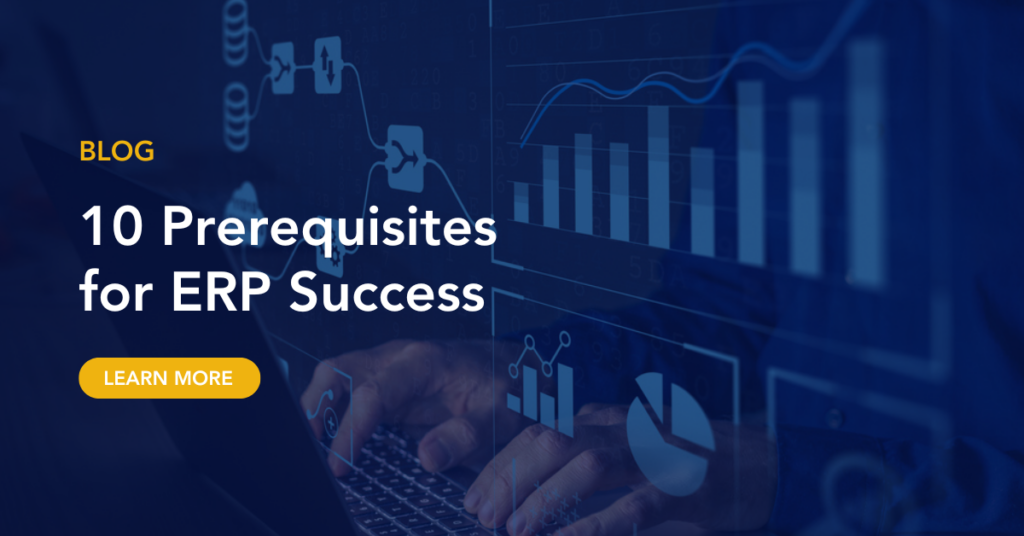10 Prerequisites for ERP Success

Enterprise resource planning (ERP) systems play an important role in streamlining processes, optimizing resources and enhancing overall efficiency. However, implementing and leveraging ERP successfully requires careful planning, strategic alignment and robust execution. Here are 10 key prerequisites essential for achieving ERP success within an organization:
1. Clear Business Objectives
Before embarking on an ERP implementation journey, it’s critical to define clear and achievable business objectives. Identify the specific problems you aim to solve or opportunities you wish to capitalize on with ERP. Whether it’s improving supply chain visibility, enhancing customer service, or optimizing financial reporting, align ERP goals with broader organizational strategies.
2. Executive Sponsorship and Leadership
ERP initiatives need strong executive sponsorship and leadership. Top-level support is crucial to secure resources, manage change effectively and drive adoption across departments. Executives should actively champion the ERP project, communicate its importance and lead by example.
3. Cross-functional Team Collaboration
Form a cross-functional implementation team comprising representatives from key departments such as finance, IT, operations and human resources. This team should collaborate closely throughout the ERP project lifecycle to ensure diverse perspectives are considered and organizational requirements are met.
4. Comprehensive Business Process Review
Conduct a thorough review of existing business processes before ERP implementation. Identify inefficiencies, redundancies and areas for improvement. Streamline and optimize processes to align with ERP functionalities and best practices.
5. Data Quality and Integrity
Ensure data quality and integrity are prioritized. Cleanse, validate and migrate data accurately into the ERP system. Establish data governance policies to maintain consistency, accuracy and security post-implementation.
6. Scalable Infrastructure and IT Readiness
Assess your organization’s IT infrastructure and readiness for ERP deployment. Evaluate scalability, network capabilities, hardware requirements and integration capabilities with existing systems. Invest in necessary upgrades or enhancements to support ERP functionalities.
7. Change Management Strategy
Develop a robust change management strategy to prepare employees for ERP adoption. Provide training, workshops and resources to facilitate smooth transitions. Address resistance to change proactively and foster a culture of openness and collaboration.
8. Vendor Selection and Collaboration
Choose an ERP vendor that aligns with your organization’s industry, scale and specific requirements. Collaborate closely with the vendor during implementation, ensuring clear communication, realistic timelines and milestones.
9. Customization vs. Standardization
Strive for a balance between customization and standardization. While customizations may address unique business needs, excessive modifications can complicate upgrades and maintenance. Leverage ERP best practices and industry standards where feasible.
10. Continuous Improvement and Evaluation
ERP implementation marks the beginning of a continuous improvement journey. Establish metrics and KPIs to monitor ERP performance post-implementation. Solicit feedback from users and stakeholders regularly to identify areas for refinement and optimization.
ERP success hinges on meticulous planning, effective collaboration and relentless commitment to organizational objectives. By addressing these ten prerequisites, organizations can navigate the complexities of ERP implementation with confidence and achieve sustainable business transformation. ERP systems, when deployed strategically, can drive operational excellence and empower businesses to thrive in dynamic market environments.
Our team of ERP experts brings extensive industry experience, ensuring a strategic alignment with business objectives. enVista provides end-to-end support throughout the ERP journey, from initial planning and vendor selection to implementation, training and ongoing optimization. By leveraging enVista’s expertise, organizations can navigate complex ERP landscapes more effectively, mitigate risks and unlock the full potential of their ERP investments, ultimately driving operational efficiency and business growth. Contact us today to learn more.

